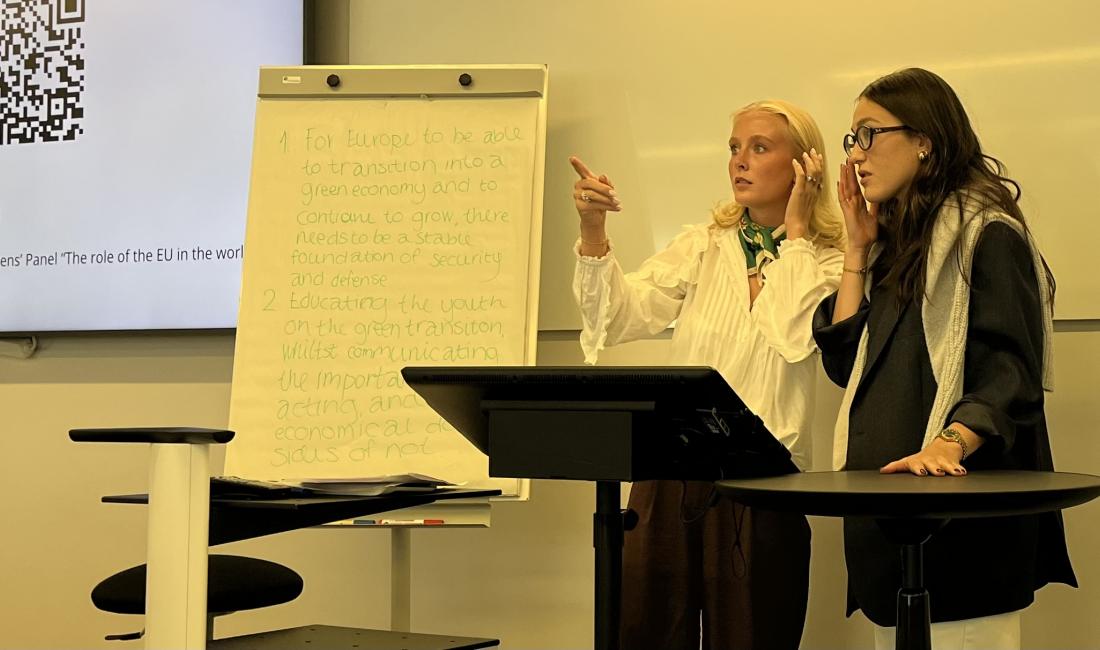The EU for Global Transnational Citizens' Panel in Madrid on the 27th of September, 2025 hosted by IE Univrsity explored how Europe’s relationships with key regions: the Americas, Africa, and Asia, can evolve amid shifting power balances and global challenges. From trade and defense to democracy and the green transition, the discussions revealed both the EU’s influence and its limits as a global actor.
In a world facing mounting geopolitical tensions, climate threats, and social fragmentation, the European Union stands at a crossroads. Born as a peace project on a war-torn continent, the EU today seeks to extend its founding values, democracy, multilateralism, and human dignity, beyond its borders.
I. Across the Atlantic: Old Allies, New Realities
The transatlantic relationship, once considered unbreakable, is being tested. Speakers highlighted how political unpredictability in Washington, especially under leaders like Donald Trump, has strained EU-U.S. cooperation. Trump’s preference for bilateral deals with European nations, rather than engaging the EU as a unified actor, exposed the fragility of transatlantic diplomacy. Yet, beyond personality politics, deeper asymmetries persist. The United States dominates in finance, technology, and military capacity; Europe trails behind. The EU’s “original sin,” as one speaker put it, lies in its historical dependency, particularly in defense and trade. Still, Europe remains the world’s largest market, a normative power that shapes global standards in consumer protection, sustainability, and human rights. Its commitment to multilateralism and the rule of law remains its strongest diplomatic currency. However, democratic backsliding within the Union threatens this credibility. The rise of Eurosceptic and populist parties in countries like Hungary, Italy, and the Netherlands has eroded internal unity. To preserve its democratic identity, Europe must strengthen civic education, communication, and citizen engagement, turning abstract ideals into lived experiences.
II. Europe and Africa: A Partnership Beyond Aid
Africa, the cradle of humanity and one of the world’s youngest continents, presents both challenge and opportunity. By 2050, nearly 40% of Africans will be under 35, a demographic surge that could fuel prosperity or instability, depending on how partnerships are built. The conference’s Africa panel called for a shift away from “white saviourism” toward genuine cooperation. The EU’s Global Gateway initiative, which directs investment in education, health, and infrastructure, was praised as a step toward a fairer relationship. A single vaccine dollar, one expert noted, can yield a fivefold return on social impact, a reminder that development is not charity but smart economics. However, democracy promotion remains complex. Imposing models from above has often failed; democratic legitimacy must emerge from within. Aid, too, requires reform: rather than fostering dependency or corruption, it should resemble the Marshall Plan’s model, locally administered, accountable, and focused on building educated, empowered elites capable of driving Africa’s own development. Trade was another focal point. Fair trade principles and corporate due diligence can ensure that Africa’s agricultural and mineral wealth benefits its people, not exploitative intermediaries. Yet contradictions persist: Europe’s own agricultural subsidies distort markets and undermine African producers. Ultimately, the goal must be equality, not between donor and recipient, but between partners shaping a shared future.
III. Europe and Asia: Between Cooperation and Competition
Asia, home to 60% of humanity and the world’s fastest-growing economies, represents both a test and an opportunity for the EU’s global ambitions. Europe’s engagement with the region, through trade agreements, digital initiatives, and green partnerships, has deepened, but challenges remain.
China looms large. Its Belt and Road Initiative (BRI) has reshaped infrastructure and investment landscapes across continents. The EU’s Global Gateway seeks to offer a transparent, sustainable alternative, emphasizing private-sector collaboration and human-centered development. Yet critics argue it arrived late, often duplicating pre-existing projects. Despite differences, particularly over Ukraine and trade mechanisms like the Carbon Border Adjustment Mechanism (CBAM), many Asian nations view the EU as a stable and ethical partner. The key lies in dialogue and pragmatism: understanding that China’s industrial overcapacity or India’s protectionism are rooted in domestic contexts, not ideological hostility. Security, too, is broadening beyond the military sphere. Maritime protection, cyber defense, and hybrid threats now shape Europe’s Asian engagement. The EU’s evolving identity as a “geopolitical actor” must balance normative power with strategic realism, focusing on economic security, supply chains, and critical materials while upholding liberal values.
IV. Students’ Reflections: Rethinking Europe’s Global Role
The conference’s concluding student workshops echoed a central message: Europe’s future influence will depend not on military might, but on moral consistency and intellectual renewal. On the green transition, participants emphasized that peace and security are prerequisites for sustainability. Green defense spending and renewable technologies can coexist, provided Europe communicates their necessity effectively. On migration, the EU must stop outsourcing its borders to autocratic regimes. True security lies not in walls but in addressing root causes, poverty, conflict, and inequality. Development must empower local communities, not impose external models. On misinformation and civic apathy, participants called for education reform and media literacy to strengthen European democracy from within. Digital engagement, transparency, and easier access to EU institutions are essential to bridging the gap between citizens and Brussels.
Conclusion: Europe’s Values in Global Motion
The EU4Global conference in Madrid revealed an enduring truth: Europe’s power does not rest on coercion, but on conviction. Across continents, it must prove that its values, democracy, solidarity, sustainability, are not just ideals, but practical tools for cooperation in a fractured world. As the EU navigates the turbulence of great power rivalry, climate urgency, and social change, its challenge is not to dominate, but to inspire. If it can remain steadfast in its principles while embracing new partnerships, Europe will continue to serve not only as a Union of nations, but as a Union of global purpose.
Find the recommendations from the other Citizens' Panels across Europe here.




